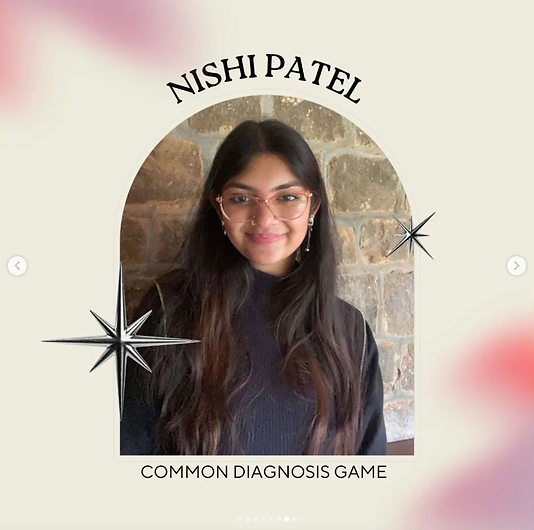KODI HEALTH
EXPOSITION
Our CAS project called "Kodi Health Expo" consisted of seven members, and each member held a different responsibility. The main idea behind our CAS project was to educate people about healthcare in a fun and interactive way, that involves people in different educational games such as a myth vs fact contest. The different activities included myth vs fact activity, a quiz contest, and an emergency response session.
My role in the expo was to help create the common diagnosis game, which included formulating different symptoms that participants would be required to decipher and diagnose based on previous and common knowledge.


For the common diagnosis game, I first went to our CAS supervisor, Ms. Joy, who eased me into the logistics of the game and how it would work. She then shared a CDC case game called "Poisoned picnic" where the main idea behind the case was to give the participants information about the duration of picnics, the people that attended, the food that was brought, how the food was cooked, and the time and cause of death of each person in the picnic, and the main goal is to figure out which virus might have caused the deaths at the picnic. We started to work behind this concept and game idea, however, later we decided it might be too lengthy and decided to shorten it to a few questions with a few symptoms. For example:
DIAGNOSIS 1:
Symptoms observed arriving gradually
NO aching muscles
Coughing/ Sneezing
Runny nose
Hoarse Voice
Do the symptoms show signs of a common cold or flu?



KODI HEALTH EXPOSITION REFLECTION
1. How did this experience assist you in identifying your goals and developing areas of growth?
I hoped to become more well versed with the safety precautions to take when posed with a health risk and to expand my knowledge set to areas outside my preferred major, i.e. engineering. This CAS project helped me achieve just that, not only did I get to educate myself while researching for the common diagnosis game, but I also got to learn safety precautions for health risks through the emergency medical response session. This helped me grow in areas I was lacking in, such as knowledge on differentiating between different types of illnesses, viruses, etc.
2. What challenges did you have in this experience? Which skills did you develop?
It is important to note that due to issues with my family, I was required to travel back home during the execution of the CAS project, which limited my access to resources and limited my contact with my team members as well. This was a challenge in the experience however, this challenge helped me improvise and think on the spot. I had to contact my team through technological means which oftentimes was inconvenient due to personal obligations, setting times, etc. but I learned to manage through it and effectively communicate with our team leader and my team partner. Hence, due to this, I developed communication skills and collaborative skills.
3. What did you learn by initiating your CAS experiences/ project that you can use again?
As mentioned previously, the communication and collaborative skills I gained through the project will come in handy again during teamwork-heavy projects. It is important to be able to work efficiently in teams as it is the best way to bring in different skill sets to maximize the quality of the outcome/ result. Due to these reasons, I believe I will use the skills I have gained in a multitude of different ways in the future.
4. How did you show commitment and perseverance? In what ways did you gain skills?
I was incredibly committed to the project, again, as I mentioned before, I improvised to complete my work with maximum efficiency and quality. Through that commitment, I was able to research and gain new skills. Researching endlessly to come up with symptoms and diagnoses for the common diagnosis game helped me gain insight into how to diagnose common flu/ colds, illnesses, and viruses. Working 1000s of miles away from my teammates helped me gain communicative skills and collaborative skills.
5. In what way did you gain skills for working collaboratively?
I gained collaborative skills by coordinating with my teammates from home and working efficiently and tirelessly with them to perfect the common diagnosis game, and trusting that they too put in the work and effort to make questions for the game or execute the event.
6. Which issues of global significance are you engaged in and taking actions in?
7. How are you recognizing and considering the ethics of choices and actions in this experience?
Although there were no ethical concerns involved with this experience, the Kodi health expo was mainly designed to address moral issues, spread awareness, and educate.
